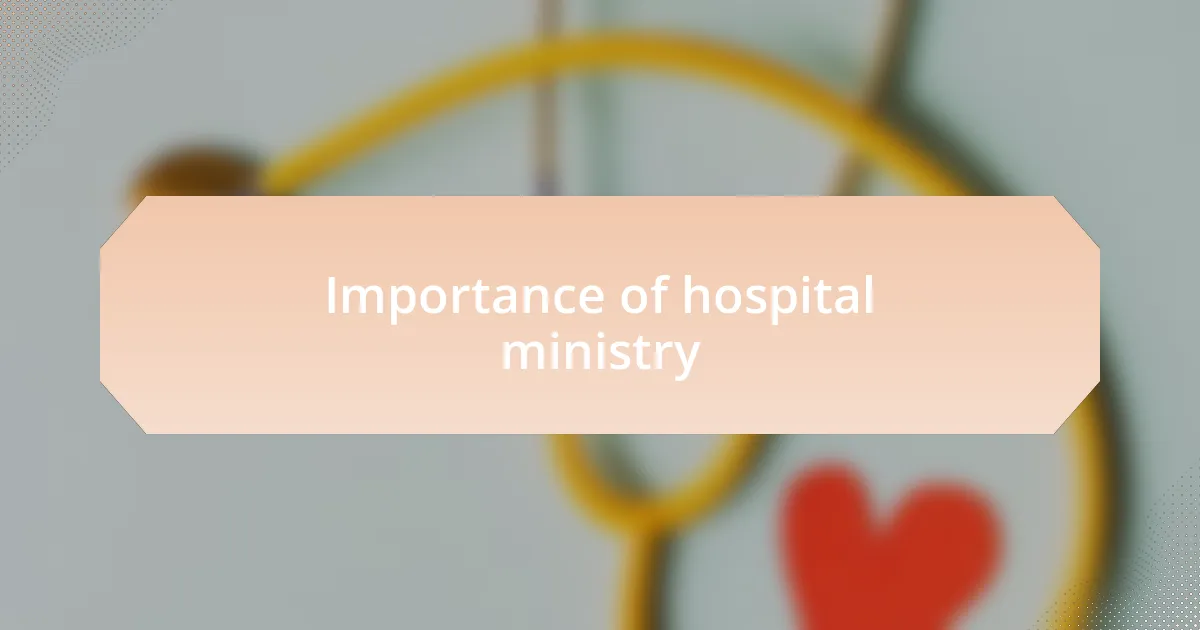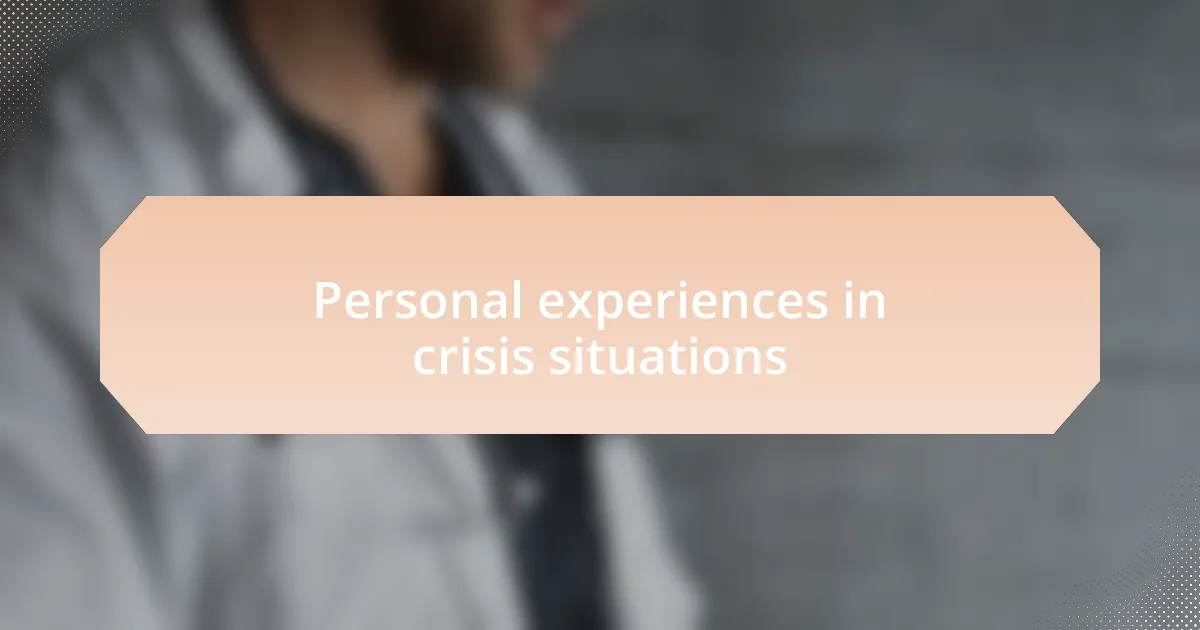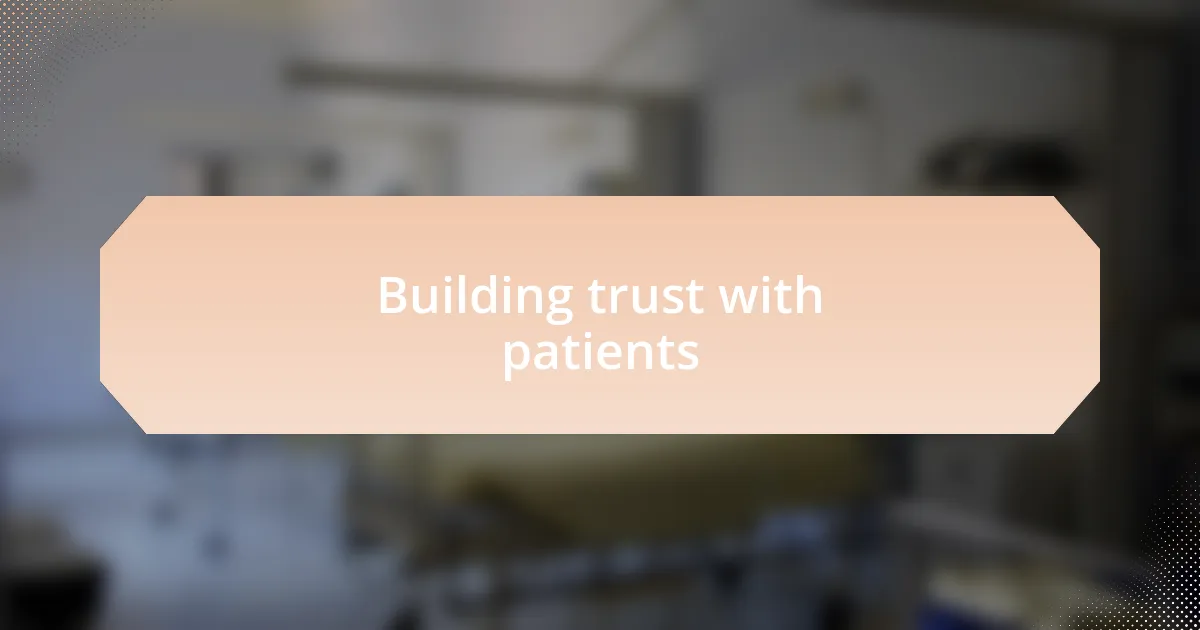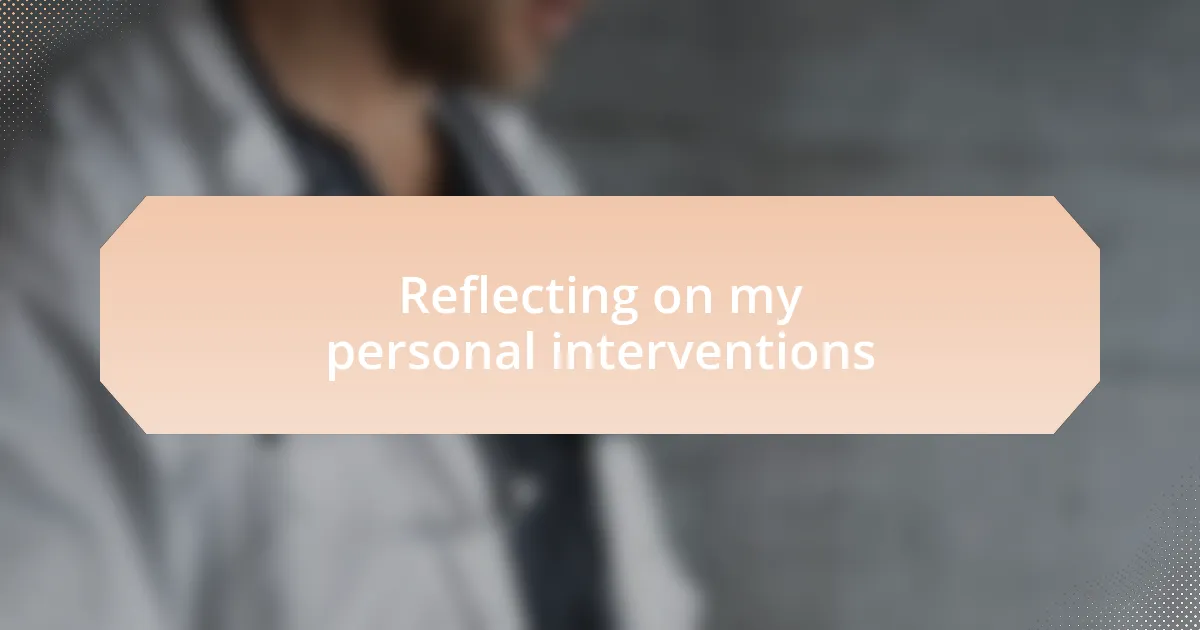Key takeaways:
- Crisis intervention involves creating a safe space for individuals to express emotions and find hope during distressing times.
- Effective ministry in hospitals relies on empathy, presence, adaptability, and nurturing hope to support both patients and families.
- Building trust with patients is crucial and can be achieved through genuine relationships, consistency, and honoring their autonomy in care decisions.
- Personal experiences and shared vulnerability foster deep connections, enhancing the healing process during crises.

Understanding crisis intervention
Crisis intervention is all about providing immediate support in times of emotional turmoil or distress. I remember a moment when I sat with a patient who had just received a devastating diagnosis. The fear and uncertainty in their eyes were palpable. It made me realize how crucial it is to create a safe space for people to process their emotions, helping them find a glimmer of hope amidst the chaos.
In my experience, effective crisis intervention requires empathy and active listening. Have you ever felt like someone was genuinely there for you at your lowest point? I have, and it transformed how I approach others in crisis. By simply being present and validating their feelings, you can pave the way for healing and clarity, allowing individuals to regain a sense of control in their lives.
What often struck me in these situations was how impactful small actions can be. I recall comforting a family member who was overwhelmed with grief after losing a loved one. A gentle touch or a few calming words can make all the difference, fostering connection and understanding when people need it most. This simple yet profound approach underscores the essence of crisis intervention: meeting someone where they are and guiding them through the darkness.

Importance of hospital ministry
When I think about the importance of hospital ministry, it strikes me how much it transforms the atmosphere of healing within a clinical setting. I once witnessed a chaplain comforting a patient who was profoundly scared before surgery. Their presence wasn’t just a service; it was an anchor for the patient, reminding me that compassionate care goes beyond medical treatment.
In hospitals, spirituality often intersects with the healing process. I recall a conversation I had with a nurse who shared how often patients asked for someone to pray with them. This need for spiritual connection is a powerful reminder that, in moments of vulnerability, many seek more than just physical healing; they crave emotional and spiritual support.
Moreover, the importance of hospital ministry extends to families as well. I remember spending time with a family waiting for news about their loved one in surgery. The fear and anxiety in that room were palpable, but when the hospital chaplain joined us, a sense of calm began to settle. This illustrates how vital it is to bring hope and comfort to not just patients but everyone affected. When the spirit is nurtured, it can truly foster resilience in the face of crisis.

Key principles of effective ministry
Effective ministry in a hospital setting hinges on two key principles: empathy and presence. I recall a moment when I sat beside a patient who had just received a life-altering diagnosis. Simply being there, listening to their fears and uncertainties, reinforced the idea that genuine connection can help lighten the burden they carry. It’s often in the small gestures—like holding a hand or offering a kind word—that we find the most profound ministry.
Another vital principle is adaptability. Each crisis situation brings its own unique set of circumstances and emotional responses. I remember adjusting my approach when a family member was in distress; rather than offering theological answers, I focused on being a supportive listener, letting them express their grief and confusion. This flexibility ensures that our interactions are relevant and responsive to the immediate needs at hand.
Lastly, cultivating a sense of hope is essential. I’ve seen how hope can shift the atmosphere in a hospital room, even in the darkest times. One patient shared with me how a simple affirmation of their strength inspired them to keep fighting through an arduous treatment process. It raises the question: how can we better infuse every interaction with a sense of optimism? By fostering an environment that encourages hope, we facilitate healing on multiple levels, reinforcing the ministry’s transformative power.

Personal experiences in crisis situations
During my time in hospital ministry, I encountered a mother whose child had just been diagnosed with a severe illness. I remember the way her hands trembled as she clutched the hospital chair, her eyes filled with fear. In that moment, I chose to share my own experience of loss, which created a bridge of understanding. It was a vulnerable exchange—one that invited her to open up about her worries. How often do we overlook the power of shared experiences in healing?
There was another occasion when I found myself in a waiting room filled with anxious families, each one wrestling with their own uncertainty. I took a moment to circulate, offering small conversations of reassurance. One father shared how he felt helpless, and my heart ached for him. In that instant, I imparted how I once felt powerless in a similar situation, but found strength in community support. Reflecting on that interaction, I realized that vulnerability can be the catalyst for connection during chaotic times.
I also recall the time when I spoke with a teenager undergoing a critical surgery. Initially, they were quiet and withdrawn, unwilling to express their feelings. I gently encouraged them to share what they feared most, and to my surprise, they opened up about their dreams and aspirations. I felt a sense of warmth as I listened, knowing that acknowledging those hopes could provide comfort amid uncertainty. Isn’t it remarkable how acknowledging someone’s dreams, even in a hospital setting, can foster a glimpse of normalcy in the midst of crisis?

Strategies for compassionate care
In my experience, one effective strategy for compassionate care is active listening. I remember chatting with an elderly patient who felt invisible amidst the hustle and bustle of the hospital. By simply taking the time to sit down and listen to her stories about her life, I saw her face light up. It’s amazing how just being present and truly hearing someone can provide comfort and affirmation, isn’t it?
Another approach that has proven invaluable is using gentle touch. Not long ago, I held the hand of a woman undergoing a difficult emotional journey after losing her spouse. As I offered my hand, I could feel her tension ease just a bit. It reminded me that sometimes words aren’t necessary; our physical presence can convey understanding and support in a heart-wrenching moment.
Finally, I can’t stress the importance of creating a safe space for emotions. One night, while comforting a parent whose child was in critical condition, I encouraged them to express their anger and fears. As they let their feelings flow, I knew I was standing with them in their pain. This shared vulnerability often leads to healing, don’t you think? By allowing ourselves to feel—both joy and sorrow—we foster deeper connections in the most trying times.

Building trust with patients
Building trust with patients hinges on establishing genuine relationships. I recall a particularly poignant moment when I reached out to a patient who was hesitant to share their fears about an upcoming surgery. By presenting myself authentically, sharing my own nervousness about past procedures, I could feel their barrier slowly dissolve. Isn’t it fascinating how vulnerability can pave the way for connection?
I also find that consistency plays a crucial role in building trust. I made it a point to check in on a patient throughout their stay, providing a comforting presence in the often chaotic hospital environment. Each time I entered the room, I noticed their anxiety lessened just a bit. It’s remarkable how our actions can reassure someone that they are not alone in their struggles, don’t you think?
Moreover, to truly build trust, I believe we must honor the patient’s autonomy. I vividly remember discussing treatment options with a young adult who wanted to make an informed decision about their care. By encouraging them to express their preferences and actively involving them in the process, I saw their confidence grow. When patients feel they have a say in their care, it fosters a deeper sense of trust and respect—something we should always aim to cultivate.

Reflecting on my personal interventions
Reflecting on my personal interventions, I remember a time when I sat quietly with a patient experiencing panic during a critical moment. I simply held their hand, allowing them to feel my presence without any pressure to speak. In that silence, I realized that sometimes, just being there is the most powerful intervention we can offer.
Another memory comes to mind where I used a visual aid to explain complex medical information to a family overwhelmed with uncertainty. As I unfolded the diagrams, I observed their furrowed brows begin to relax. It struck me how vital it is to break down information into digestible bites; people often just need a little clarity in their chaos, don’t you think?
I’ve learned that sharing my personal experiences can create impactful connections. I once shared my journey through loss when comforting a grieving family. Their initial shock melted into understanding, and in that shared sorrow, we found a bridge of empathy. Isn’t it amazing how our personal stories can resonate so deeply with others in their moments of crisis?